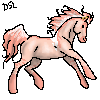
As much as she enjoys her solitude, the dun mare will always find her way back to someone. She is too primal in her need to be held to stay alone for long. It’s why she keeps finding Walter – he is a tether to remind her how far she can roam from Beqanna. To miss him is to know that it is time to return; time spent missing him is time spent thinking about him, and she would rather live in carefully constructed oblivion than risk the crushing failure of unrequited emotion.
Though she’s is not precisely guilty of schadenfreude, Djinni does hope Astri’s rapid breath is the result of their brief contact. She finds the green mare appealing and has always enjoyed the effect she has on others in this manner. Her ability to change herself to whatever the other finds most desirable has always been beneficial, though this may be the first time she’s ever only been herself. They share a brief moment of amusement at the folly of stallions, and Djinni does her best to over-analyze the sound of the other mare’s laughter, trying to see if Astri is as dismissive as all mares or if her derision is something more.
The request for help is not at all what she had expected, and before she can reply Astri is already calling out for the filly nestled in the reeds.
Djinni has never spent much time with children, at least not since she was a child herself. They are small and fragile things, so easily swayed and broken. It’s better to leave them be, to let those more responsible take charge. Over the years, her reluctance has developed into something akin to dislike; not because they are children, but because she does not trust herself and it is best to remain untempted. But Astri has placed the child directly in front of her, and Djinni cannot very well tell her that she’d rather not. Instead she smiles – because that is the polite thing to do – and says: “Hello Dacia.”
She’s never been sure how to speak in front of a child when she has no interest in conversing with the child itself, so she glances once more at Dacia and then back at Astri. “Can’t her father teach her?” She asks, tilting her head curiously for a moment before adding: “Or is he not…” there are more delicate ways to ask, but she finishes with “around?” The dun mare had been raised among a passel of full siblings - the byproducts of their parent’s adoration of each other – but she knows that not all families are like her own. Some are simply mares and their children, and that only until the child is old enough to be weaned.
Perhaps Dacia’s father is not around, or perhaps he is and the girl’s gift is a spontaneous eruption of Beqanna’s magic in unexpected places. She’s asked both to satisfy her own curiosity and to learn more about the green mare she stands beside. Astri might have a beloved mate waiting for her wherever home is, but perhaps she does not. Djinni is not disinclined to share (she’s disinclined to monogamy entirely despite her own family history) but she’d rather know what she’s dealing with.
“Picture a blue sky,” she says turning back to the filly, having made her decision to address the child in precisely the same manner she’d address and adult. “Close your eyes and imagine that all you can see is the sky. Let it fill your whole head.” That’s all it takes for Djinni: that complete focus on exactly what she wants. Perhaps Dacia will be the same.
sorry im so late with this D: D: D:

